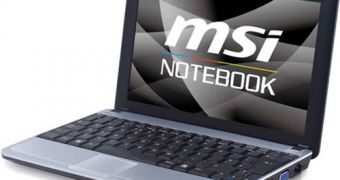According to a recent report that surfaced on the Internet, the Redmond, Washington-based software giant Microsoft has banned netbook vendors from developing systems with hybrid storage and Windows XP OSes. Microsoft's decision directly affects one of MSI's most successful netbook products, the Wind U115, which combines an integrated Solid State Drive and a traditional hard drive to deliver an increased system performance and battery life. Following the aforementioned report, MSI has felt the need to reassure its customers that the U115 is here to stay, for a while.
The report about Microsoft's interdiction has surfaced in a recent news-article on bit-tech, starting a series of reactions from netbook fans worldwide. According to the paper, the Taiwanese netbook maker has until the end of June to discontinue selling its Wind U115 netbook system, consequently depriving users of an alternative to all those basic netbooks available on the market. MSI, as well as other netbook vendors, won't be allowed to sell a hybrid netbook system with Microsoft's Windows XP operating system.
Following the aforementioned report, MSI has reacted with a statement made by the company's German PR team, which was published by the German-language netbooknews.de. According to it, the MSI Wind U115 netbook will continue to be available, in its current configuration until October this year, when Microsoft is due to roll out its new Windows 7 operating system. Following the release of the much anticipated operating system, MSI is expected to make some adjustments to the product range, which will also affect said netbook model. The “adjustments” that are to be made haven't been disclosed, but it's likely that MSI will unveil a new version of said netbook running on Windows 7.
Microsoft's Window XP operating system is currently featured on most netbook systems on the market, with Microsoft expected to support the OS until 2014. However, the software giant is clearly gearing up for its next-generation OS, which is expected to be featured on the majority of computer systems in a not so far future.

 14 DAY TRIAL //
14 DAY TRIAL //